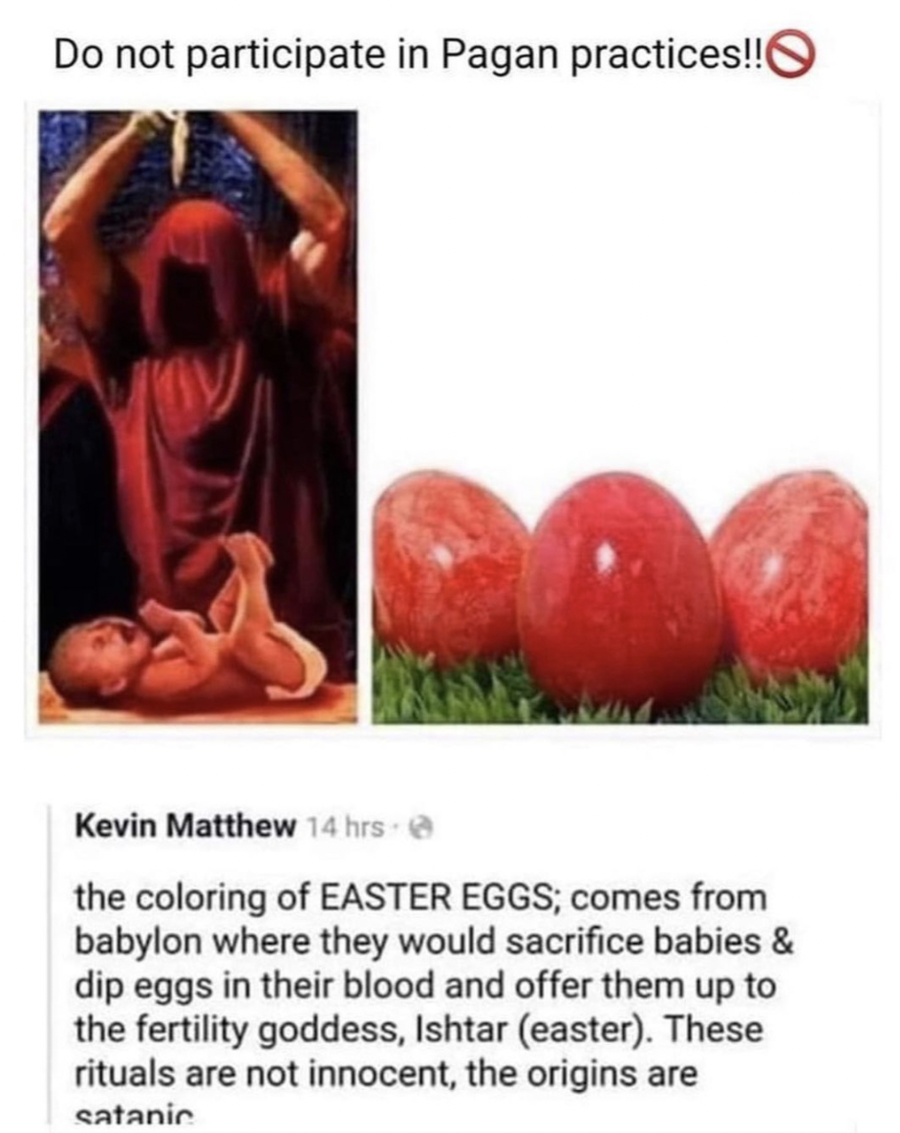
Did the tradition of Easter and egg-dying originate as a celebration of Ishtar, the Babylonian goddess of fertility and sexuality? No, that's not true: Easter is related to the Germanic Ostern, a Christian holiday that celebrates the death and resurrection of Jesus Christ and is perhaps linked to an ancient Germanic goddess Oestre, two religious studies experts independently confirmed to Lead Stories. Ishtar "has nothing to do with Easter" and suggested connections between Easter and the Babylonian goddess are "a false etymology," according to the experts.
A version of the claim appeared in a screenshot shared on Instagram on April 5, 2023, that featured an image of three red eggs alongside a illustration of a cloaked figure holding a dagger-like object over an infant. Text on the screenshot read:
Do not participate in Pagan practices!!
the coloring of EASTER EGGS; comes from babylon where they would sacrifice babies & dip eggs in their blood and offer them up to the fertility goddess, Ishtar (easter). These rituals are not innocent, the origins are satanic
Below is how the post appeared at the time of this writing:
(Source: Instagram screengrab taken Thurs April 6 10:02:18 UTC 2023)
Babylon was the center of Mesopotamian civilization, in what is now Iraq. Iterations of the claim that Easter originated with the Mesopotamian deity Ishtar date back to at least 2013, reported AFP Fact Check in April 2021. In the decade since, videos shared on YouTube and numerous posts on Facebook recirculate annually in advance of the Christian holiday.
In an email to Lead Stories received April 6, 2023, Juan Campo, an associate professor of religious studies at the University of California, Santa Barbara, confirmed that there is no link between the Easter holiday and the deity Ishtar. Any such connections are "a false etymology."
"Ishtar, alas, has nothing to do with Easter," Campo told Lead Stories.
Ishtar, also known as Inanna, was a central figure in the ancient Mesopotamian religion and represented the goddess of love, beauty, war and fertility, according to the Brooklyn Museum.
Mark Edwards, a professor of early Christian studies at the University of Oxford, suggested in an email received by Lead Stories on April 6, 2023, that Easter may have connections to the ancient German goddess of spring Eostre, sometimes called Ostara, who is associated with the German festival Ostern. Some customs, such as the emphasis on Easter bunnies and eggs, may have roots in European pagan traditions. (Scholars have presented several widely accepted theories as to the Christian origins of the Easter egg, from burials to encourage fertility to preserving food during the fasting of Lent, which TIME and the Library of Congress explained in 2017.)
"It is quite possible, though not firmly proved, that Easter in Anglophone countries, and presumably Oestern in German, are named after a pagan deity who had given her name to the month in which the celebration of the resurrection normally fell," Edwards told Lead Stories, adding that Easter is a commemoration of a "presumed historical event" (the death and resurrection of Jesus Christ) and "its dating is linked, in a rather complex manner, to that of the Jewish Passover, which was allegedly the time of Jesus' death."
Despite the similarity in names, Edwards confirmed that there "there does not seem to be any strong pilological warrant" for linking modern and historical iterations of Easter to those of Ishtar and any such connection may simply be a coincidence because the names look somewhat alike.
"It is always hazardous to draw such connections between a Semitic and an Indo-European language, unless the process of transmission can be historically verified," added Edwards.














